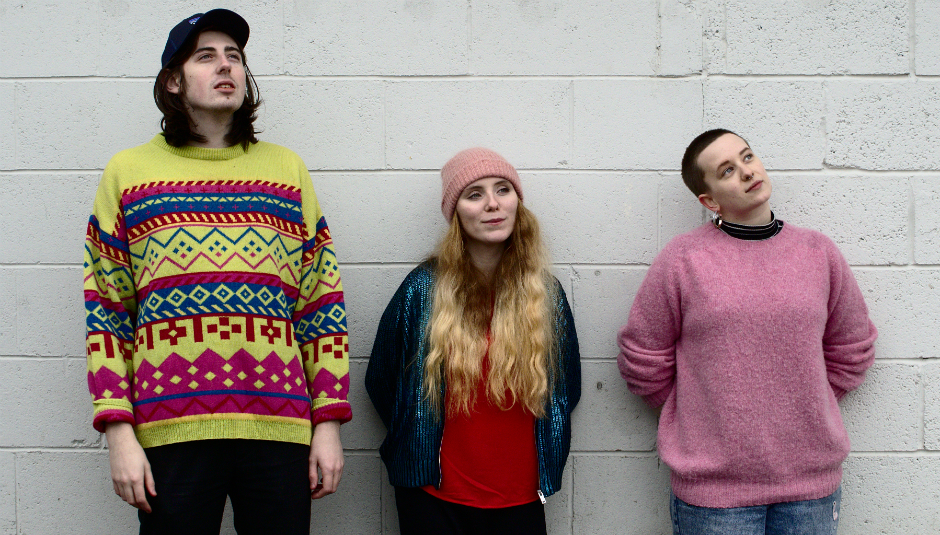In song, Breakfast Muff don’t mince words. Listening to Eurgh! is like ducking and weaving through a food fight – you never really know what’s about to be slung your way, but you can bet that it’ll splatter on your shirt. There’s absolutely no coded irony or esoteric allusions to parse through, no chewing through extraneous fiber to reach the juicy pulp underneath. Some folks go both ways; some people dig duvets; some men are jerks. Easy, right? Yet, while the three misfits of Breakfast Muff may come off as fresh-faced amateurs, don’t be fooled; before and after bonding under one banner in 2014, they’ve been gigging in tons of other righteous outfits around town, like Spinning Coin, Rapid Tan, Mary Column, and even Joanna Gruesome.
Now – in person, Breakfast Muff are somewhat trickier to tap than their gushing melon melodies. As both Eilidh McMillan and Simone Wilson lack a laptop, we hook up through the phone via WhatsApp – and, thanks to the spotty wi-fi at their particular (and peculiar) Wetherspoons in Glasgow, we’ll have to tag each other at least four times before either of us break through to the other side. Plus, neither McMillan or Wilson can vent to a stranger with the same fervor as their songs – which is fine, since I can relate. Nevertheless, between imposed silences and stumbled interruptions, we still manage to cuss some vital stuff, like the state of DIY in Glasgow, the cons of the drinking culture, and how McMillan cultivated her stance on gender politics.
DiS: How did these songs come together? (i.e what was the time period in which they were written?)
Simone Wilson: Hmm…what’s the oldest one?
Eilidh McMillan: Probably ‘Lunch Money’? Yeah, the very first song.
SW: Because we recorded that at the same time as we recorded the second album, but we didn’t like the way that it sounded. But I guess all of it was written over a year? It wasn’t all written at once. Hmm…how are we going to describe this…
EM: What was the original question?
Well – I think I’ve got the general timeline down. You said it took about a year – and was that [also] to record?
SW: Well, we recorded it in four days. So we did random voice memos and stuff for about a year and then recorded it properly in four days. And we got to do anything we wanted, like record our vocals in a big hall. And we were grouped all together, so we didn’t have to go into a green room. We just recorded it in one huge hall.
So it’s very obvious that you guys are really involved in gender politics, and that that’s super important for you. What was your entry point into that? Because I know that’s different for everyone, at what point when you first realized: “Oh, this is actually important”?
SW: Just seeing things in real life, and examples of things that are unfair and offensive for the transgendered. Places should be accessible for everyone. But then, Eilidh, she’s got something to say –
EM: Oh, Jesus. Well, for me – one of my parents is trans, so I was exposed to a lot of really good stuff early on [about] acceptance and being who you are, but also seeing the negatives of that as well, and how that affects people and how it’s difficult to fight against binary and patriarchal structures. But for me, it was a really slow build of anger through my life – you just learn more and more every day.
SW: And it’s so fucked!
EM: Yeah. And initially, what you see is what’s around you, and then you find out more about what’s going on in the world for different people, and how different intersections of society work together. But a lot of the things I’ve learned come from online, and cool intersectional feminists –
SW: Memes.
EM: Yeah, on Instagram. And also podcasts. The Internet’s been really useful for me.
Also, I’m sure you’ve been exposed to a lot more, since – well, I’m assuming that you were both born and raised in and around Glasgow, an urban environment .
SW: Well, Eilidh is from Aberdeen, but that’s not that far away. But I’m from a rural area, so that was pretty different. In a lot of ways, growing up somewhere rural makes it really hard if you’re not what people see as the average.
Oh, yeah. I’m very aware of that because I grew up in a rural environment too. So there were so many of these things that I wasn’t even aware of. There was maybe one queer kid in our entire class, and nobody wanted to hang out with him except for the very, very, VERY outcast kids.
SW: Me and Cal are from Glasgow, though, so we do see shit.
Going off of gender politics, though – you have a song on the album called ‘I Like To’, which runs through all of the sexual orientations in a very explicit way. Which is great! But I was wondering why you thought it necessary to write a song like that.
SW: I think we were just making fun at the start.
EM: Well, for me, it’s because I’m bi[sexual], so everyone, from all sides of the spectrum, will be like, “Oh, so you’re straight now. Oh, so you’re gay now.” And it’s like, “No, no, I’m bi. I’ve explicitly told you this.” But people are still nosy – [they’ll go], “So what ARE you?” So [with this song] I’m like, “OK, here you go.” So it’s explicitly being funny, but also “IS THIS WHAT YOU WANT FROM ME?”
I know that all three of you have all been in other bands. How did you all gravitate into getting into all these bands?
SW: Well, the two of us met at this course in Green Door studio, in Glasgow. It was [one of the] free courses for people who want to get into things, but don’t know how. So, it’s just a studio, and you go in, and do cover songs, and learn to mix and record and all that. But we never knew each other until we met there. And we then we all met loads of different people there in the Glasgow music scene. I was only 16, Eilidh was only 19, so we were just like –
EM: [in baby voice] We wanna learn!
SW: - so we just did loads of stuff, and became really active. That was four years ago now.
Wow! That’s incredible. That just astonishes me, how people can just jump into things.
SW: I don’t really know how it happened. I wish I could explain. We just met some really nice people and found a great practice space with people in the Winning Sperm Party collective, and they’re really active in doing gigs and outdoor generator gigs and stuff like that. We’re gonna try and start that back up. And Green Door also does things in Ghana, and runs the African Arts Center here, and [they do] drumming classes. But that’s only started in the past two to three years.
Yeah, I read on Tenement TV that you guys went to Ghana. I take it that was the reason?
SW: Yeah, me and Eilidh went together in 2008.
EM: A big ol’ trip.
Cool. It sounds like you’ve got a really supportive community in Glasgow, but I read one of your other interviews that said there was a lack of diversity there.
EM: Yeah, well, for me – I suppose, in Glasgow, there are lots of different scenes, and there’s a lack of communication between them, almost like a lack of crossover. And another thing that doesn’t help on the diversity front is there are loads of venues. And they’re all bars, and commercial, so there aren’t a lot of DIY spaces. And most of the promoters at these venues are dudes, so there’s not too much diversity, although I think that’s getting better. But the punk and indie scenes are still super white. But there’s [the] Spite House collective, which Simone is a part of, who are queer bands and bands with women, and non-binary people, and they put on loads of amazing gigs. But there’s not much else going on, to be honest.
SW: Yeah, they’re the only ones doing it. Not regularly, anyway.
Whereas, here in Atlanta, we are seeing more queer bands and non-binary bands, and people of color stepping up and doing things, and it’s been great. But I guess it really depends on the city and what support systems are available.
SW: Yeah. When you go somewhere else and see how much more inclusive it is, like in Brighton, then people that make [those places good] are moving up. Recently, in the past few [years], a bunch of pals and friends have moved up to Glasgow, and it’s changed a lot since that. Like our friend Andrew, who does Spite House, moved here about two to three years ago.
I was also wondering – because I listened to your Song, By Toad interview from a while back…
SW: Oh, boy. I was actually drunk.
Ha, no shame in that. I enjoyed it. But now, you were talking about ‘Raspberry Pavlova’, and the type of boys that only read NME and don’t really get it. Which made me go off on a tangent, and wonder: What, then, is the ideal thing to read for music?
EM: I don’t really know, honestly. I mostly learn about music stuff from my friends and social media. There are some good podcasts – but I guess, just mainly DIY stuff that mostly interests me. But then, I’m not super up on music journalism. I was once asked: “What are your influences?” and I just said, “I don’t have any influences!”
SW: Do you know the Le Sigh? I really like that website.
That’s fair. I get a lot of different answers from that. Several people say it’s just from touring with other bands, which I can see as well.
EM: Yeah, that’s true.
Anyway, yeah, ‘Raspberry Pavlova’ is a great song.
EM: Cal wrote that one.
But I don’t think “disco boys” is really a phrase here in the US – if you said that to anyone…
SW: Oh, I don’t think it’s a saying. We made it up! But you know the type – the people who wear polo shirts.
EM: Yeah, what were you saying – shoes and jeans? Are shoes and jeans cool?
SW: That, and they’re usually just quite loud and whiny and annoying. Cal was quite annoyed about that.
I wanted to talk a little bit more about Scotland in general. First of all – why do you think Scotland swung the Tory vote so much? That seemed to take everyone by surprise.
EM: Well, first of all, it was still a general [SUP] majority. The Tories got 12 seats out of however many. And also – it’s really complicated in Scotland, because there’s that thing about independence, and that’s also tied not just to the people that want independence vs. the people that don’t want independence on a basic level, but also tied into a social thing with people who are Protestant, or not. I think also – we’ve also had three elections here in two years. The media is also fucked up, and biased, and they just try to trick people.
SW: I don’t know if I’d even say “trick”.
EM: And there’s been all these attacks, and it plays into scaring people and carrying on with what’s already there. Obviously, I’m really disappointed, but at the same time, I don’t blame people, because it’s really confusing. How do you even understand what’s really going on at the moment, even if you’re someone who’s really interested and tries to keep up with stuff – where do you go? Where is the good information? And just not try to fucking witch-hunt people. A lot of people are already disillusioned – you don’t want to disillusion people more.
Yeah – sorry, that’s a major tangent, but it’s been weighing on my mind a bit, too. I was watching the [results] on the Guardian that night.
SW: I only watched until 2 AM! And that was only a quarter of the way through.
How has gigging been lately?
SW: I think we used to play shows all the time, and now life has gotten in the way a bit. But when we play, it’s still really fun. We all swap around, and no one does any one thing for any length of time – which isn’t a plan, who’s swapping when. And sometimes you don’t plan it well, and we’re just standing waiting to swap.
EM: Yeah, we’re doing a tour at the end of July with a band called Neurotic Fiction. And [we’ll] hopefully do an album launch, but we need to sort that out. And maybe get down to Glasgow, but we’re not being very organized. But Amour Foo, who’s putting it out, is very organized, and has been a huge help in helping us organize.
Apart from that, hopefully we’ll play more soon. I can’t think of any other big shows.
SW: If you know any booking agents…
EM: It can be quite hard, booking tours, because the UK’s so small.
Have you had any problems or weird things happen to you at gigs?
SW: Nothing here. Well, I’m thinking of the guy from Manchester. Eilidh’s in another band called Rapid Tan – and Cal’s in that band, too – and I was in the audience while they were playing. And these two – I was told they were primary school teachers? – dropped in at seven at night, and it wasn’t even that late, but it was an all-day gig, and they’d obviously been there all day, just steaming and getting fucked in the face. They didn’t even realize how much space they were taking up. It just made you guys really on edge. And they’re coming up to you and going, “Come on, love! Do it!” And Eilidh kicked him in the back!
EM: Oh, I didn’t kick him hard. I just pushed him away, because they were coming right up and shit and not backing off. Also, a guy heckled me from the crowds.
SW: It was horrible!
EM: Yeah, it was bad. Also, the thing is, I literally told them, explicitly –
SW: “Don’t come near the stage!”
EM: And telling them: “Don’t take up so much space”, because they were making everyone around them uncomfortable. And they still didn’t get it. And that’s one of the big things when we play shows of any kind, and we explicitly tell people to calm down, or stop taking up so much space, or let other people in, and people just ignore you. That’s the worst thing because it’s treating you like a non-person. But yeah, there’s a lot of things about someone who’s really close up, or on the stage, and don’t take a hint and fuck off,
SW: Or shout things like: “Oh, thanks for that”. That makes so much of a difference.
EM: Also, sometimes [there’s] shit like sound engineers being dicks, but that’s not really anything new, is it? Also, in that other band as well – I just sing, I don’t really play an instrument, so sometimes I feel like I’m being treated like I’m somebody’s girlfriend. [At first] it’s like: “Oh, get out of the way”, and then [after we play] it’s like, “Oh, shit.” Yeah, sorry: it’s hard to think of specifics.
No, that’s pretty good, actually. I’ve seen that happen a lot, too – especially at house parties. People do not know how to control themselves at house parties.
EM: Yeah. It’s horrible.
SW: It’s hard when you see people having a nice time, or people really dancing about when we played this one time, but we couldn’t stop because we’re playing, and we saw some guys pushing. But everyone wanted that, they wanted to go mental at that time. People are just really selfish, and they think that their good time is worth more than other people’s enjoyment. Or not even enjoyment, just other people feeling safe and comfortable. And that sucks.
And I think in Glasgow, that’s one of the problems: this scene is so integrated with the drinking culture. And so that’s a problem because people will go to gigs and get so drunk. Literally, everyone’s drinking. I stopped drinking five months ago, and it was really weird. Still kind of weird, to be honest, because it’s such a huge part of what goes on.
EM: It’s a social thing.
SW: Yeah, I kind of feel like a social pariah.
That’s exactly why I’ll go up to bars and ask for a Blenheim, which is this ginger beer. And it’s an amber drink in a bottle, so it looks like I’m drinking.
SW: Yeah, it’s kinda sad that if you look like you’re drinking, then no one will bother you about it.
Eurgh! is out now via Armour Foo Records. For more information about the band, including upcoming tour dates, please visit their BandCamp page.
Photo Credit: Paul Burt






















